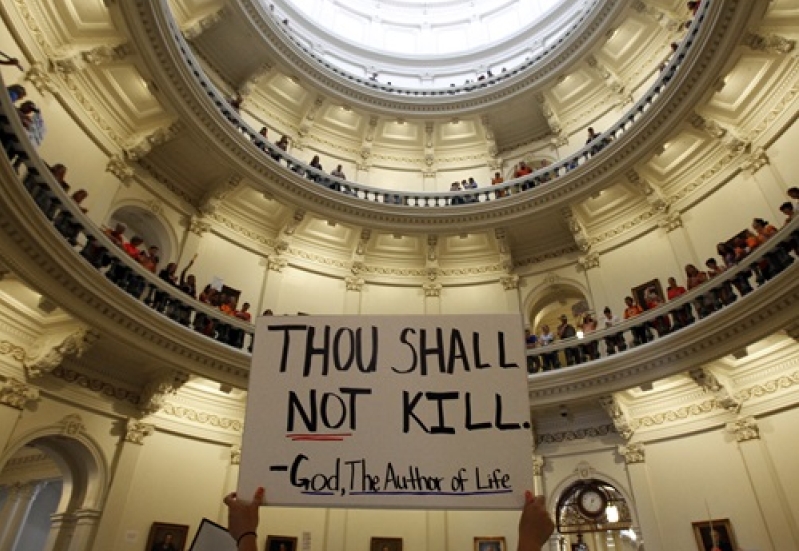
The Texas Senate passed late Friday the late-term abortion bill, two weeks after Gov. Rick Perry called for a second special session to continue consideration of the bill in the Senate – it originally failed to gain approval because of a 13-hour filibuster by Senator Wendy Davis.
Amid the loud-protests from the raucous crowd, the Republican-dominated Senate voted 19 to 11 to the late-term abortion bills, which is making its way to Perry, who has pledged to sign it. The bill was passed for the second time in the Texas House with a 96-49 vote on Wednesday morning, after having been debated over for ten hours on Tuesday.
“I listen to the word of God in this issue,” said Republican Sen. Dan Patrick, adding: “Are we a nation that stands for a Judeo-Christian ethic, or are we not?”
The passage of the bill comes after weeks of divisive protests and demonstrations that drew national attention and thousands of activists from both sides to Austin, staging rallies and marches.
Pro- and anti-abortion activists flooded the Texas Capitol on Friday afternoon, setting the stage for a dramatic ideological showdown. Abortion rights advocates wearing orange were holding gynecological devices and signs, while anti-abortion advocates dressed in blue carried images of fetuses and Bible verses, according to The Associated Press.
The Republic legislators who support the bill say that it isn’t about banning abortions, but rather protecting women’s health.
The measure bans abortions past 20 weeks of gestation, unless a women’s health is in immediate danger. It mandates abortion clinics become ambulatory surgical centers, tightens usage guidelines for the drug RU486, and requires doctors who perform abortions to have hospital-admitting privileges within 30 miles at the clinic at which they’re providing such services.
Abortion-rights activists say the measure will force the closure of all but five of the state’s 42 abortion providers. About 80,000 abortions occur in Texas each year, according to the Texas Department of State Health Services.
High-profile voices from both sides of the abortion debate. Rick Santorum, former Senator and 2012 presidential candidate, came to Austin to support the bill. He said that "Texas is the center of the pro-life debate in the country right now," according to Reuters.
Sen. Jane Nelson said, “There is a clear choice in this vote tonight. Do we keep the lax standards, do we forgo safeguards, do we ignore the evidence that at 20 weeks we have a child who can feel? Or do we choose life?”
Despite the democratic opposition, the bill was eventually passed in the Republican majority legislature.
“Today the Texas Legislature took its final step in our historic efforts to protect life,” the governor said after the bill’s passage. “This legislation builds on the strong and unwavering commitment we have made to defend life and protect women’s health. I am proud of our lawmakers and citizens who tirelessly defended our smallest and most vulnerable Texans and future Texans.”
Once the law is signed, Texas would become the seventh state to require doctors performing abortions to have admitting privileges at a local hospital, and the 28th to require abortions to be performed in ambulatory surgical centers.
In anger responses, Planned Parenthood called on pro-abortion supporters to vote for politicians who will protect women’s access to health care. Opponents to the bill hope that the legislation will be blocked by federal lawsuits and declared unconstitutional.
Democrats in the legislature have said that while there was little they could do to keep the bill from passing, they plan to challenge it in federal court.
“We do not have the numbers to stop it,” said Democratic Sen. Royce West of Dallas, according to The Associated Press. “As soon as it’s signed by the governor, it will be challenged … we believe the whole bill is unconstitutional.”






